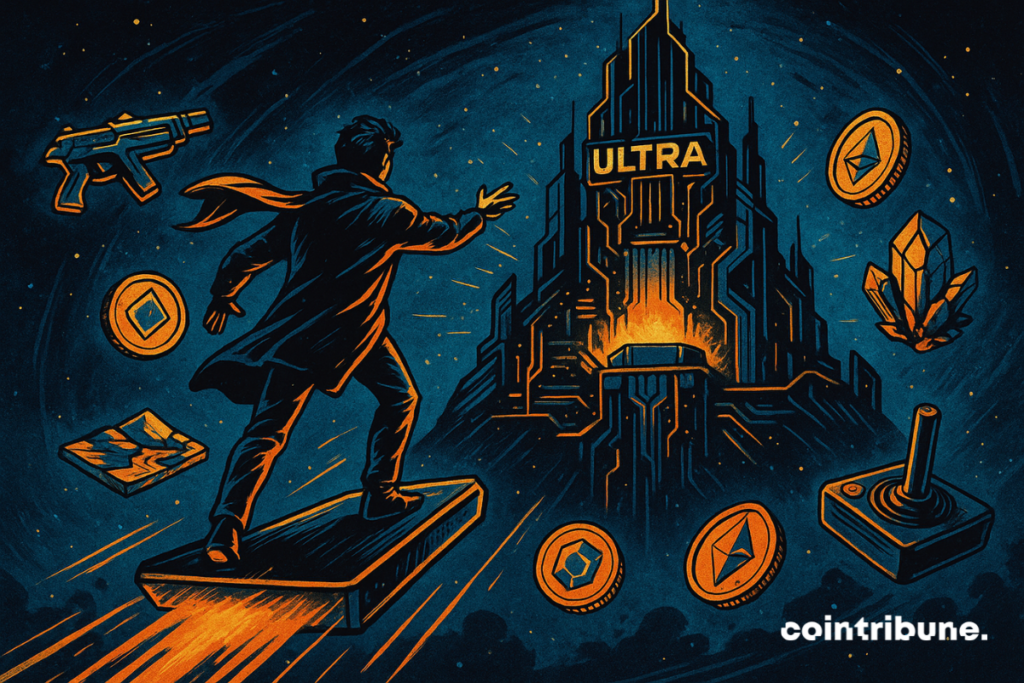How Ultra and Gus van Rijckevorsel Are Disrupting the Gaming Economy – Exclusive Insights
The gaming industry's financial infrastructure is getting a blockchain-powered overhaul—and Ultra's leading the charge. We sat down with co-founder Gus van Rijckevorsel to unpack their playbook for decentralizing virtual economies.
Breaking the Publisher Stranglehold
Traditional gaming giants take 30% cuts on transactions while locking players out of asset ownership. Ultra's Web3 ecosystem flips the script—letting gamers trade skins, characters, and items peer-to-peer with actual property rights. "We're turning microtransactions into macro-opportunities," van Rijckevorsel says.
The Tokenomics Behind the Boom
Ultra's native token isn't just another speculative asset (though yes, it did 8x last bull run). It fuels everything from NFT minting to esports betting across their platform. Early adopters are already earning more from gaming than their day jobs—assuming they held through the 2023 dip.
Wall Street Meets respawn Points
When asked about traditional investors dismissing play-to-earn models, van Rijckevorsel smirked: "Hedge funds still think 'liquidity pools' are swimming facilities." His team's now onboarding institutional partners—after they finally grasped that digital swords trade for more than some small-cap stocks.
The endgame? A $200B gaming industry where players—not publishers—control the economy. Place your bets.

In Brief
- Ultra creates a smooth bridge between Web2 and Web3 without sacrificing user experience.
- Players become producers of value through AI, digital ownership, and a collaborative economy.
- With EMPIRES and Citadels, Ultra offers an ecosystem where playing, creating, and earning are interconnected.
An Industry in Transition: From Blockbusters to Micro-Studios
Gus van Rijckevorsel immediately draws a parallel between the film and video game industries. Large productions costing several hundred million coexist today with a boom in micro-studios. Like Danish series on Netflix, small innovative games are emerging alongside giants like GTA VI. The mid-range is disappearing:.
Ultra does not position itself as the Netflix of Gaming in format, but in its ability to reinvent distribution and value creation. The goal: to give developers more freedom and offer players new ways to engage.
Player 3.0: Play, Watch, Create
The player is no longer just a gamer. Today, users play, watch, and create content. Each of these activities generates value. Viewers represent an economic pillar through advertising. Content creators leverage videos, comments, and mods. The player becomes a component of a new trinity shaping the gaming economy.
This change forces platforms and studios to rethink their models. You can no longer design a game without including the creators who enrich it, the viewers who amplify it, and the communities who adopt it.
The Mirage of Pure Web3 Gaming
Pure Web3 gaming still does not attract real gamers. As Gus says in the interview: “If you find a Web3 gamer, tell them to call me“. Web3 remains obsessed with monetization, while the majority of players seek fun, competition, or social interaction. Result:.
Ultra proposes a hybrid path. Web3 should not replace Web2 but augment it. It becomes an invisible LAYER that strengthens the experience without disrupting it.
Ultra, EMPIRES & Citadels: The Web2/Web3 Integration Model
The interconnection between Ultra, EMPIRES, and Citadels embodies this vision. Citadels is an ultra-realistic FPS meeting Web2 standards. Its economy relies on a deeply integrated Web3 layer: EMPIRES, where players produce resources (ore, weapons, land) then used by Citadels players, thus influencing the Web2 game economy. Meanwhile, Ultra orchestrates transactions, takes a commission, and ensures smooth operation of the whole.
For example: when a Citadels player dies and needs new equipment, they buy it through a traditional in-game shop, but this item was produced by an EMPIRES player.
One plays, the other profits.
A New Revenue Sharing Model
Traditionally, publishers captured most of the profits. Ultra reverses this logic. Web3 players, as owners or producers of digital assets, can now generate income. This opens the way to a participatory economy where studios no longer control the entire value chain.
Users can create weapons, develop environments, or extend gameplay. DevOps becomes collaborative, shared between developers and players. Welcome to the era of Open Source, community-driven, and economically virtuous gaming.
Artificial Intelligence: A Creative Catalyst
In this ecosystem, AI plays a key role. It lowers entry barriers, empowers non-technical creators, and accelerates content production. A player can now create a skin, write a story, or build an environment without mastering modeling or coding.
According to Gus, AI doesn’t provide solutions, it creates bridges between problems and ideas. With simple tools, anyone can bring complex concepts to life. Combined with Web3, AI becomes a powerful force to democratize creativity.
A Cultural and Generational Evolution
Video gaming is no longer a niche. Today, a father and son can play the same game, each in their own way. From Candy Crush to Counter-Strike, all genres are part of a shared cultural space. This democratization also transforms marketing. Brands can no longer ignore it.
Strategic partnerships, like those planned with Red Bull, illustrate this evolution. By combining emotion, storytelling, and gameplay mechanics, brands reach a wide, engaged, and multi-generational audience. Games become media, players targets, and the gaming economy extends to all sectors.
With EMPIRES, Ultra launches more than a game: a new way to conceive, produce, and experience gaming. By merging the power of Web2 and the potential of Web3, the platform offers a practical, inclusive, and sustainable model. Players are no longer mere participants: they become economic drivers. Thanks to AI and a participatory vision, Ultra redraws the sector’s boundaries. To be part of this revolution, visit Ultra.io, try EMPIRES, and discover what “playing together” means in the age of decentralized gaming. You can also follow @Ultra_io on X and listen to the full interview in French on Spotify, Deezer, Apple Podcast, Amazon Podcast… or in English with auto-generated subtitles on YouTube.
Maximize your Cointribune experience with our "Read to Earn" program! For every article you read, earn points and access exclusive rewards. Sign up now and start earning benefits.

